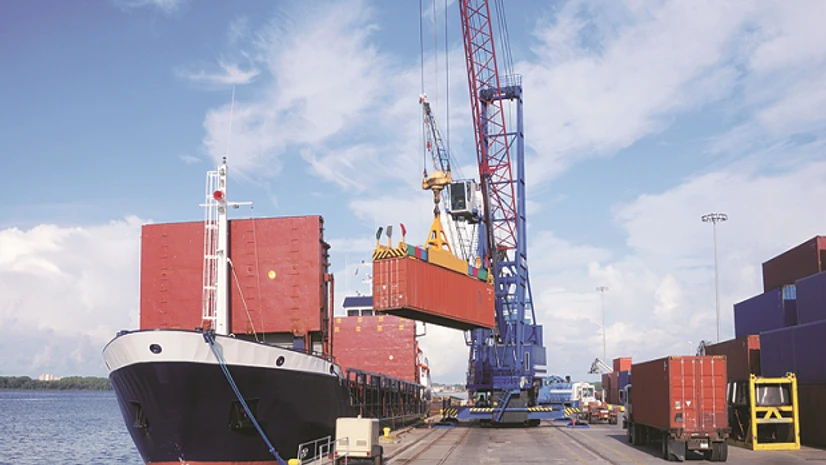India needs to act in a fast-track manner for removal of non-trade barriers (NTBs), being faced by domestic exporters in different countries like the US, China and Japan, to achieve one trillion dollar outbound shipment target for goods by 2030, a report by think-tank GTRI said on Tuesday.
The Global Trade Research Initiative (GTRI) has suggested a two-pronged strategy to mitigate the influence of NTBs on exports.
It asked for upgrading domestic systems, in cases where Indian products are rejected due to quality issues; and retaliating if unreasonable standards or rules continue to obstruct exports from New Delhi.
"Many of India's exports suffer due to time taking prior registration requirements and unreasonable domestic standards/rules in many countries. India must talk to partner countries for reasonable solutions, GTRI Co-founder Ajay Srivastava said.
He added that many of India's food and agriculture products face problems due to higher pesticide levels, presence of pests and contaminations due to foot and mouth disease.
"India must take each issue and address it in the shortest possible time, Srivastava said adding "India's exports are far below potential as they face NTBs in the EU (European Union), USA, China, Japan, Korea and many other countries".
More From This Section
Key Indian exports that routinely face high barriers include -- Chillies, Tea, Basmati Rice, Milk, Poultry, Bovine Meat, Fish, Chemicals Products to EU; Sesame Seed, Black Tiger Shrimps, Medicines, Apparels to Japan; Food, Meat, Fish, Dairy, Industrial Products to China; Shrimps to the US; and Bovine Meat to South Korea.
According to the report, the other products which face these barriers include Ceramic Tiles in Egypt; Chili in Mexico; Medicines in Argentina; Microbiological Regents in Saudi Arabia; Electrical, Medical Devices, Household Appliances in Brazil; Veterinary Pharmaceuticals, Feed Additives, Machinery in Russia.
Most non-tariff measures (NTMs) are domestic rules created by countries with an aim to protect human, animal or plant health and environment. NTM may be technical measures like regulations, standards, testing, certification, pre-shipment inspection or non-technical measures like quotas, import licensing, subsidies, government procurement restrictions.
When NTMs become arbitrary, beyond scientific justification, they create hurdles for trade and are called NTBs (non-tariff barriers).
The hindrance posed by NTBs on India's export performance is a critical challenge. A time frame must be decided to resolve important NTBs, it said.
About these barriers, the report said that there are three sub-categories that are reducing pesticide levels in food products; presence of pests like food and mouth disease; and higher inspection due to suspect product quality.
India's exports of basmati rice, chillies, tea and many other agriculture products face difficulty in foreign markets due to higher use of pesticide and fungicides.
The traces pesticides leave in treated products are called 'residues' and a maximum residue level (MRL) is the highest level of a pesticide residue that is legally tolerated in food or feed.
Citing certain examples, the report said the EU has set MRL for tricyclazole, a fungicide in rice, to 0.01 mg per kg as against the ten times higher limit earlier. Now the EU has proposed to raise the limit to 0.09 as the current level is unreasonable and hampers trade.
Similarly, the EU has set MRL for aflatoxins B1 level in chilies and other spices at 5 to 10 ppb (parts per billion). The US limit is a higher 20 ppb for all spices. The European Union has set the level for Anthraquinone for tea at 0.02 mg/Kg.
No tea grower in India uses anthraquinone as a pesticide. Tea leaves get it from the dust in the atmosphere. Japan stopped importing sesame seeds from India from 1992-93 due to pesticides/DDT traces, it said.
Export of milk and poultry, bovine meat products to the EU and bovine meat to China and South Korea is difficult due to the prevalence of foot and mouth disease (FMD) in India.
India needs to invest in creating FMD free zones to export freely, it suggested.
It added that each consignment of Black Tiger Shrimp and Vannamei exported from India to Japan undergoes 100 per cent inspection by Japanese Authorities. This is done to rule out the presence of an antibiotic residue called Nitrofuran metabiolite AOZ.
There has been no detection of AOZ in Black Tiger shrimp for the last three years.
Likewise, the EU has increased the sampling frequency from 10 per cent to 50 per cent on marine products exported from India due to frequent detection of prohibited antibiotics.
Mexico has also suspended import of Indian dry chilies in May, 2017 after live pest (Trogoderma) was detected in two containers.
Further regarding registration systems in different countries, the report said that registration, in most cases, requires physical submission of documents and payment of exorbitant fees.
"Big pharma firms abuse patent laws as they recycle and repurpose old drugs and patent them as new, thereby encouraging ever-greening of patents. Three of every four drugs associated with new patents are not new, but existing drugs. This delays the launch of affordable generic drugs, it said.
(Only the headline and picture of this report may have been reworked by the Business Standard staff; the rest of the content is auto-generated from a syndicated feed.)

)
